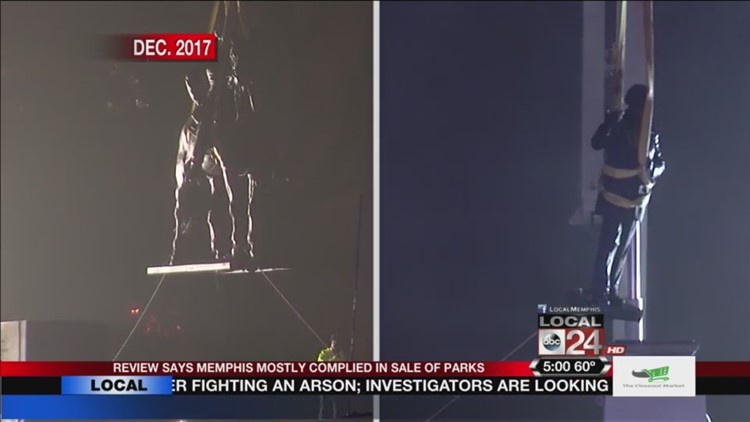Some are celebrating after the Tennessee Comptroller’s Office weighed in on how the city of Memphis took down its Confederate monuments.
In December, the Memphis City Council found a loophole in a state law when it sold two Memphis parks for $1,000 each to a private non-profit, so crews could take town three Confederate statues.
The 13-page comptroller report said the council did not violate open meeting or non-profit sale rules, but did get around real estate application rules.
The report comes as the future home of Memphis’ Confederate statues, including the General Nathan Bedford Forrest statue, is an ongoing legal battle.
“I think overall they indicated that the sale was legal, which was our main concern,” says Van Turner with Memphis Greenspace, Inc.
Turner, who is a Shelby County Commissioner, is President of Memphis Greenspace, Inc., the non-profit which now owns two former Memphis parks.
A comptroller report released Wednesday concluded the Memphis City Council’s December sale to that non-profit did not violate city ordinances. This, even though Health Sciences Park is valued at nearly a million dollars and sold for $1,000.
“There had been some past transactions in which that was been done, I think they made a good faith decision,” says Turner. “We want to assure that we do the right thing, we do the respectful thing and I think that’s what we are committed to doing.”
“The comptroller did not investigate everything involved in the sham sale,” says Lee Millar with the Sons of Confederate Veterans.
Millar felt differently. He believed the comptroller report didn’t examine whether the city council violated gravesite laws beneath the Forrest statue’s pedestal.
But he says, “It certainly showed the city did things incorrectly.”
Earlier this month, state lawmakers, nearly all in east Tennessee, introduced bills seen as retaliation to Memphis City Council’s December move.
“The entire region is incensed on what the city did, sneaking in at night and stealing the statues, so I think the hostility toward the city is still there,” says Millar.
A judge in Nashville recently ordered mediation be resolved by March 16th on the sale and removal of those statues, which are in an undisclosed location.
“Not a whole lot of details decided on the mediation but it’s apparent to us, the statues should go back up,” says Millar.
The Sons of Confederate Veterans also filed a lawsuit against the city of Memphis and Memphis Greenspace, Inc. last month.
In the report, city leaders also float three possible homes for the three Confederate statues, namely the Parker’s Crossroads battle site between Memphis and Nashville.
In response to the comptroller report, City Council Chair Berlin Boyd texted Brad Broders: “I’m just happy this is behind us.”
Memphis’ Chief Legal Officer Bruce McMullen issued this statement:
“The state audit reinforces what we have stated all along—the sale of the parks and statues was proper and legal.”
(TN COMPTROLLER’S OFFICE NEWS RELEASE)
The Comptroller’s Office has completed a review of the City of Memphis’ December 20, 2017 sale of Health Sciences Park and the easement to Memphis Park to Memphis Greenspace, Inc.
The sale of the parks followed the city’s unsuccessful attempt to receive a waiver from the Tennessee Historical Commission to remove a statue of Nathan Bedford Forrest from Health Sciences Park. After the parks were sold, statues of Nathan Bedford Forrest, Jefferson Davis, and James Harvey Mathes were removed by Memphis Greenspace, Inc.
The Comptroller’s Office was asked by Lieutenant Governor Randy McNally (R-Oak Ridge) and House Speaker Beth Harwell (R-Nashville) to review the city’s compliance with the Tennessee Open Meetings Act and other state and local laws.
The Comptroller’s Office of Open Records Counsel determined the Memphis City Council provided sufficient notice of its meetings and agendas and did not violate the Tennessee Open Meetings Act. Comptroller auditors have also concluded the City of Memphis acted with the authority granted by the Memphis Code of Ordinances to sell the parks to a non-profit at less than market value.
However, auditors noted the City of Memphis did not follow all of the guidelines provided in its Code of Ordinances. The city did not require Memphis Greenspace, Inc. to submit an application to the City Real Estate Department before the properties were conveyed as required by the Memphis Code of Ordinances (Section 2- 16-1(G)(2)). The purpose of this application is to gauge an entity’s financial strength and overall stability.
The City of Memphis maintained it was able to determine the non-profit was financially capable of maintaining the parks by meeting directly with Memphis Greenspace, Inc.
The city also provided auditors with three other instances when it had sold property without requiring an application to the City Real Estate Department.
The Comptroller’s Office is recommending the City of Memphis should enter into a formal memorandum of understanding with Memphis Greenspace, Inc. for the storage and protection of the historic figures and artifacts.
The sale and removal of the statues are currently the subject of litigation in Davidson County Chancery Court. To view the report online, CLICK HERE.



